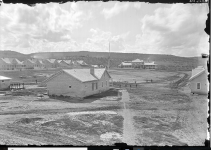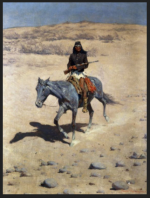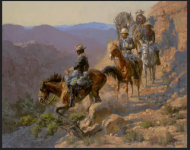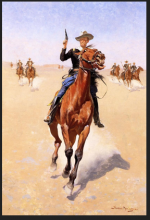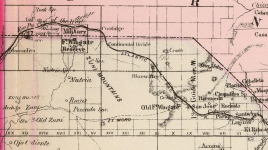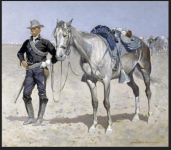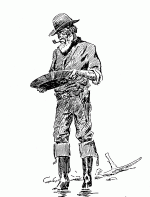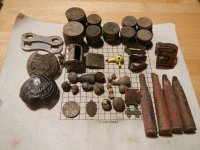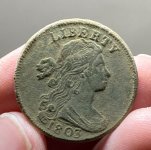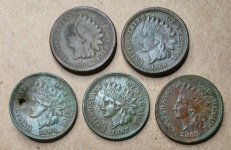Old Bookaroo
Silver Member
- Dec 4, 2008
- 4,318
- 3,510
THE BAG WITH THE NUGGETS
A Story of Fort Wingate in the Days of Navajo and Apache Raids
A Story of Fort Wingate in the Days of Navajo and Apache Raids
LURE OF ARIZONA’s GOLD
Fitful Dreams of Last Days of Prospector Who Lost Reason.
Fitful Dreams of Last Days of Prospector Who Lost Reason.
by Olive Ennis Hite
Fort Wingate lay - a ragged brown dot - on the bare breast of the San Mateo desert, the full fervor of a July sun beating down on parade ground and crumbling barracks. Heat waves shimmered over the desolate waste that crept down to the trickling Rio Gallo, and far off toward the scarred sides of Mighty San Mateo's frowning crest, delicate pictures painted themselves on the radiant blue sky and marvelous lakes of azure blue water rose and faded as the mirage waxed and waned. Ah! old Wingate was in very truth "The abomination of desolation." On the roof of the guard house a tired sentinel listlessly paced his beat - around and around- pausing at each cardinal point to scan the sage brush and cactus for something that might be alive and not be one of the wild creatures of the llano, for the Navajo and Apache were "out"; by day thin wisps of smoke, by night slender spirals of flame gave warning to the forlorn little garrison that terrible foes were on the watch.
Our band was pitifully attenuated, a skeleton troop of the 3d. Cavalry and the ghost of a company of the 5th Infantry, was still further depleted by sickness and the absolute necessity of scouts throughout the mountains.
Of women, there were less than a dozen, all told: one officers wife, and the others, the laundresses and the beef contractor's wife and children. A few Mexican servants made up the small - but altogether, too large crowd of "undesirables." For we were the one invitation that threatened an attack from overwhelming numbers of Apaches. The Navajoes were nomads off their reservation "Down in the lower country," at EI Bosque Redondo, and were looking mostly for horses, mules and cattle but the fierce Apaches were out for everything they might use, abuse, torture and destroy.
It was the middle of the afternoon when everyone was within doors in a futile effort to find comfort in the thick-walled houses; the relief had just made one lagging round when sharp and menacing his carbine spoke.
There was scarcely a second till "Boots and Saddles" rung out on the air; the long roll sounded from the corrals and stables; where only silence had enveloped the post now all was animation, apprehension and curiosity. Again the sentinel's carbine spoke and that meant, "Women and children remain in quarters," and that, to us meant APACHES! On the guard house stood the commanding officer, the surgeon and the officer of the day each looking keenly over the plain toward the West. An order was shouted from the lookout and the outposts were doubled and spread; another short, firm command and a squad of dragoons trotted out toward the Gallo, while a sergeant, with his handful of infantry, went on double quick time toward the point where the commandant's orders suggested that serious trouble lay.
Sergeant MacCarthy, of the 3d., rode proudly at the head of his troopers and, aside from being entirely without fear, stood not in awe of the captain in command, who was only a foot soldier, a cavalryman's particular aversion, but was a bit of a martinet and also, supposed to be more careful of his own body than those of the men under him, suddenly pulled his big grey back on its haunches and yelled with joy: "Tell the women 'tis only wan man and he's near dead, and I do be thinkin' he's no Injun. 'Tis a stretcher we want." Dr. Longwill, only a contract surgeon but far better equal to an emergency than the Captain, waited only until he had gathered necessary restoratives, bandages and a wheelchair, which did duty for ambulance, stretcher or lounging place for convalescents, for Wingate was as barren in its hospital supplies as the homes were comfortless.
From the top of my quarters I could see something moving in the shadow of a cactus and the men stooping over it looked at each other and then at the object on the ground, then their hands would go up to their faces and they would turn away but to look again. My heart beat wildly for I interpreted each sign to mean it was some of the scouts then out and my own man was in command. Ten days they had been gone and that might be he, one of his men sent in for aid or to report a disaster which was expected, but never prepared for. With flying feet I ran toward the burden the men had swung between them and were carefully bringing in. The grizzled old Sergeant saw me coming and galloped to my side.
"'Tis not the Lieutenant, Glory be, nor is it one of the men; God only knows whut it is, but I think it's what’s left of a human bein'." And that was what it was - the piteous wreck of "a human bein'." When the rescuers reached the poor fellow he feebly moaned and moved his body. It was the last supreme effort and with closed eyes he fell back in a coma that lasted for many days. There wasn't an inch of the bony body that was not a welter of blood from cruel wounds, scarcely a shred of clothing was left and the skin drawn over the skeleton was black, broken and festered.
So must Greely and his men have looked when out of the Arctic night Schley bore them homeward. It was a sight so harrowing that those battered veterans of the 3d, turned and furtively wiped away tears of pity. Doctor Longwill, with his own hands, cut away the loathsome rags that seemed glued to the skin; tenderly washed and anointed and drew together the gaping gashes which seemed as if made by dull knives but which were the mark of desert stones over which he had dragged from far in the mountains of Arizona to where help had come.
For days there was but faint sign of life, for weeks there was no glimmer of returning reason until hope was almost abandoned that the mystery would ever be solved. That the man was white, Longwill had decided and that he was a miner there was evidence in a pouch of nuggets, each the size of a large bullet and smooth as a water-worn pebble. This pouch was tightly grasped in one parchment-like hand when picked up and the first dawn of consciousness after all the weeks of death in life was made hilarious by his querulous demand for "Them Apache bullets."
Longwill said he felt like a thief as he took them out of his desk and laid them in the hand that at closed over them like an automatic claw. "He looked at me with suspicion and fury and whispered 'Where's the bag?' The bag, alas, was too alive to keep and I told him so; he let out an oath that was horrible coming, as it did, from the awful mouth the poor devil was entertaining just then."
Whether he had eaten some noxious weed, or it was scurvy, or any other of the sinister things that might easily have befallen him, I never quite made out, but that mouth was not human and a robust oath from it must have been more than shocking. Suspicion was the predominant trait, which never, wholly, left him, but so weak and half witted was he that no one could win his confidence or gather his story. He would begin as if it was all clear with in his memory, he would tell of his companions, their search for a mine “The Injuns" had told about when he was a prisoner "AND THEY CUT AWAY MY TONGUE," which was true, a part of the tongue was missing which added to our inability to understand him, which the Doctor thought might have been a part of his incredible sufferings and not Apache fiendishness.
As he grew stronger bodily, he was allowed the privilege of the garrison; he soon found his way to our quarters where a sturdy year[-]old boy attracted him. At first I was not willing he should touch the youngster who seemed strangely drawn to the hideous face and distorted body but so humble, so gentle was he that I finally allowed him to hold him for a moment. Like a lightning flash his expression changed and his voice had a soul in it. "I have a little feller at home," he said. "Where is your home? Where is your baby?" His face grew soft and tender and his crippled hands stroked the merry, little one, but the light of intelligence was gone and in its place crept a crafty look. "You will tell the Apaches and they won't give me bullets." That was the end of the confidence I had hoped for, also to his visits - for I was afraid of him. But wherever he saw the baby he would ask to hold him "Just a minute for I have a little feller."
One day when the nurse brought the baby home she told me "El Loco" had given him the pouch, in which he again carried his nuggets, and that "El nino" had them[.] Some one had given him a bead pouch of Mexican work, and in it he carried his jealously guarded gold. To keep it was not possible; to give it back without disturbing the distraught brain that was making such a fight to come into its own - for the slightest thing would unhinge it for days - not one of us could do. But one night after he had had a particularly unhappy day Doctor Longwill asked him where his "bullets" were. He did not remember, so it was an easy matter to put them under his pillow, after he fell asleep. But, next day they reappeared with the child. Again I made an effort to learn something tangible about "The little feller" that, evidently, was in his thoughts. I found out nothing that was a clue.
We wrote to many places where we thought he might have lived. He would mention towns but never a state, and we failed to get the slightest trace of his past. One day he was eating meat and looking up at the doctor he said: "Doc, this beats the fellers I et after I got the Apache bullets; they was mortal tough them fellers." Longwill tried to follow up that admission but "Adam" as we called him shrugged his shoulders, leered disagreeably and lapsed into his usual coma.
Days passed before he had a ray of memory again and none of us cared to try to awaken his hideous recollections. The nuggets traveled back and forth between him and "The little feller" till the rains came on with a mighty cloudburst which caught my ramshackle quarters unprepared for the deluge. My Lares and Penates were buried under a slick sea of mud, mice nests, dead centipedes and other small beasties, such as the desert harbors, and as bad luck would have it, the "bullets" were in "the little feller's" keeping. In the hubbub and excitement I forgot them and when a detail of prisoners were brought in to dig out the mess "Adam" came, too. He took a hoe and dug with the rest; suddenly he let out a yell that startled my hound who, at once raised his loud baying which meant "Apaches!" and almost called out the garrison. "Adam" had found the bag and he was back again among the Apaches, crazy and dangerous. He never again had a lucid interval and in a few weeks he was carried out to the forlorn burial ground.
What was his history we never knew, but that it was full of horrors and appalling tragedies we were sure.
The nuggets at some period had played a most important part in his Arizona adventures but we never found the slightest clue to his wanderings. In those days prospectors were not common among the metal rich mountains of Arizona nor was there any story came to us or to head quarters in Santa Fe of a lost party.
What became of the gold I never knew. It was sent to headquarters, where there were rapid changes of District Commanders. "The little feller" and I went far away, the 3rd and 5th were scattered, the gold probably was lost and "Adam" has been forgotten for almost half a century.
Santa Fe New Mexican [Santa Fe, New Mexico] 20 May 1912, Vol. 49 No. 84.
As the young bride of Lieutenant Ennis, of the Third Cavalry, Olive Ennis Hite came across the plains to New Mexico in 1866, with General Greer's command and took garrison in Santa Fe under General Carleton, an officer held in grateful remembrance by old-time New Mexicans. An index of her courage even then is that she made that long, hard, perilous journey "in expectancy." Only a few weeks after the arrival in Santa Fe her boy Carleton was born.
After Lieutenant Ennis was killed in an "Indian trouble," she went east and secured a billet as reporter on the Cincinnati Enquirer, the first regularly assigned woman reporter in the United States. For many years she was “the dean of the newspaper women of the Southwest.” Returning home to New Mexico, for many years she was probably the best known woman in the (then) Territory.
She died in Los Angeles in 1915.
[Source: Old Santa Fe, April 1916, Vol. III No. 10, pages 97-98; transcribed by Richard Ramos]
Obituaries and Death Notices of Santa Fe County, New Mexico Obituaries and Death Notices of Santa Fe County, New Mexico
Lieut. Adolphus Greely, 5th United States Cavalry Regiment, led to the Arctic one of several disastrous 19th Century polar explorations. Popularly known as the “Lady Franklin Bay Expedition,” the International Polar Expedition set out in 1881. Lieut. Greeley took twenty-four men north on board the sealer Proteus - after being rescued in 1884 by Cdr. Winfield Schley, he brought five men home. Starvation, drowning, hypothermia took 17 lives. Private Charles Henry had been shot for stealing food rations. The bodies of the dead were also recovered, and after they were examined stories of cannibalism began.
In Roman mythology, Lares and Penates were groups of deities who protected the family and the Roman state. Although different, the Lares and Penates were often worshiped together at household shrines.
------- o0o -------
Good luck to all,
The Old Bookaroo
Amazon Forum Fav 👍
Last edited:
